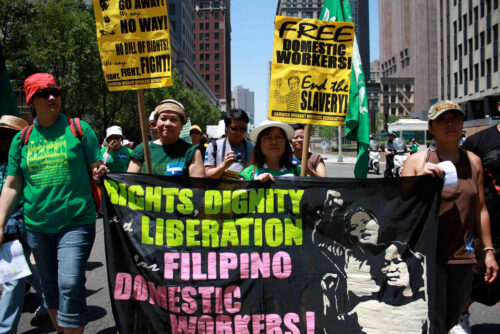“The academic diasporic or minority woman thinking transnationally must be literate enough to ask: cui bono, working for whom, in what interest?” – Gayatri Chakravorty Spivak 1
This film is an unlikely collaboration across time and space, many years in the making. Its challenges highlight the difficulties of transnational collaboration. How to make it equitable? How to make it accessible? How to make it a timely intervention?
Looking back a decade ago, in 2011 a group of student Global Symposia Fellows from Barnard College, along with Catherine Sameh, then Associate Director of the Barnard Center for Research on Women, and I traveled to Sangli, Maharashtra, India to observe a play by members of Vashiya Anyay Mukti Parishad (Collective of Sex Workers for Freedom from Exploitation). They had developed a play under the directorship of Sushma Deshpande, weaving their narrative together in a piece called Hum Aur Tum Sab (Us and You All). I had become interested in the ways in which they were using theatre techniques in their advocacy for rights for sex workers.
Vashiya Anyay Mukti Parishad (VAMP) staged the play for us, and we spent a day visiting their offices and neighborhood. I returned in 2012 to film interviews with actors and members of VAMP, and Meena Seshu, director of Sampada Grameen Mahila Sanstha (SANGRAM), an HIV/AIDS organization of which VAMP was a part. We also filmed the play being performed at the International AIDS Conference in Kolkata, India in 2012.
These conversations and interactions reaffirmed a fundamental tenet of political theatre for me – theatre is one tool of many for getting out a political message. Their choice of narrative, collaborative storytelling, and ensemble acting sharpened another aspect of feminist thought – the personal is political. That is, the members of VAMP turned to theatre as a way of reclaiming their agency in the ways in which sex workers are portrayed in popular media. Rather than operating from a space of abjection, where victimhood, escape, and rescue through rehabilitation become the primary tropes, VAMP argues for the right to be recognized as sex workers, engaged in wildly unregulated and often dangerous working conditions. It is no accident the slogan at the center of the production is “sex work is work.”
There is another immediate and powerful narrative that becomes immediately apparent in even the most casual viewing of Hum Aur Tum Sab – one which I hope even the abbreviated clips in this short film captures – the joys of collective action and sisterhood. It is a dramaturgical choice to intersperse scenes of singing, dancing, card playing, hair combing, etc. that is, a range of quotidian activities that undergird the pleasures of everyday life. Violent scenes are spliced with such moments of levity, and sometimes hilarity.
The play loosely tells the story of how VAMP came to be, from the early days of AIDS taboo when sex workers were often left to care for themselves – and sometimes their clients, and rejected by their own families, to getting members together for HIV literacy and safe sex campaigns, and fighting for civic amenities including access to healthcare facilities and schools for their children. At each stage there was push back, often violent, from local authorities and conservative factions of society. But despite the odds VAMP has persevered. And flourished. Hum Aur Tum Sab is ultimately a call to collectivity. The “aur“ (and) in the title invites the viewer into VAMP’s reality, impeling them to recognize, and celebrate our shared humanity. It points to a strategic partnership, a working through and together. As a statement unbound in space and time, it allows us to imagine and shape a collective futurity.
Works Cited
Spivak, Gayatri Chakravorty. A Critique of Postcolonial Reason. Cambridge, MA: Harvard Unviersity Press, 1999.
- Gayatri Chakravorty Spivak, A Critique of Postcolonial Reason (Cambridge, MA: Harvard University Press, 1999), 386[↑]



